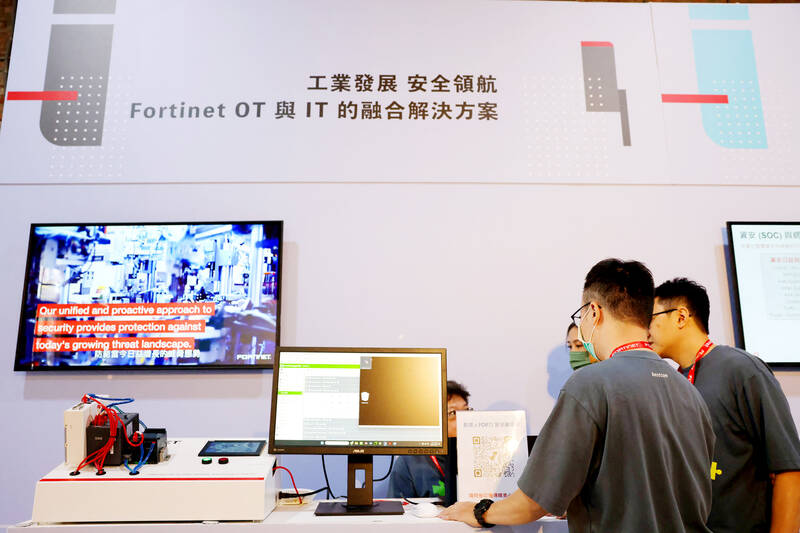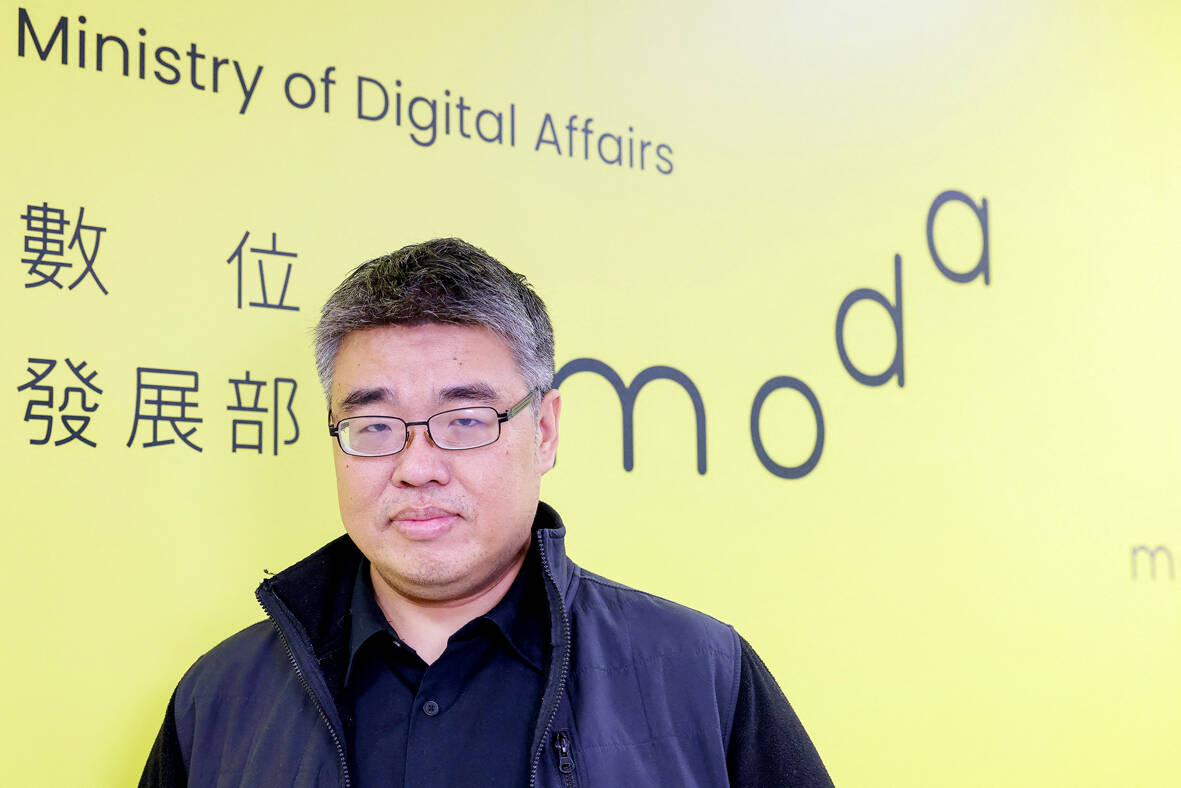Millions of people offline, banks knocked out and the world’s most advanced semiconductor industry paralyzed — Taiwan’s doomsday scenario includes not just invading Chinese troops but also a wave of attacks against its cyber infrastructure.
Taiwan’s security planners run simulated worst-case scenarios constantly to prepare for the day Beijing decides to try and take over.
If China does invade, officials and cybersecurity experts say it will not limit its assaults to security forces and defense infrastructure, but effectively disconnect Taiwan from the world.

Photo: AFP
Taiwan is facing a persistent threat from stealthy attackers who gain access to computer networks to “sit and wait within the victim’s infrastructure”, said Crystal Tu (杜貞儀), a cybersecurity researcher at the Institute of National Defense and Security Research.
They can be highly active during a time of conflict, Tu said, such as a “cyber operation aimed at the disruption of critical infrastructure — including telecommunications, energy and finance sectors.”
Cyberattacks have ramped up dramatically in the year leading up to the presidential and legislative elections today.

Photo: AFP
Taiwanese authorities have said government agencies face an estimated five million cyberattacks a day.
And the cybersecurity firm Fortinet reported an 80 percent increase in cyber attacks in the first half of last year — ranking Taiwan number one in Asia Pacific.
“The cyber operation toward Taiwan never really stops,” said Tu.
Some tactics used against infrastructure have been identified as techniques used by Chinese state-sponsored groups.
Last year, Microsoft flagged the threat from a group named Flax Typhoon that operates out of China and targets Taiwan.
The US tech giant said Flax Typhoon “intends to perform espionage and maintain access” to various Taiwanese organizations for as long as possible.
SEMICONDUCTORS
Cyberattackers have not only targeted the government and defense organizations, but also hit the semiconductor industry.
Taiwanese companies are crucial to the supply of chips, the lifeblood of the global economy.
Such is their importance that one former US official said last year that the US would rather destroy this semiconductor infrastructure than let it fall to invading Chinese forces.
Last year, Taiwan Semiconductor Manufacturing Company (TSMC), which controls more than half of the world’s chip output, reported a data breach at one of its suppliers.
“Taiwan is an important target because it is at the top of the critical high-tech supply chain,” said Fortinet’s Jim Liu. “Geopolitics and (China-Taiwan) relations could inevitably increase cybersecurity incidents.”
China has increased diplomatic and military pressure since 2016, when pro-status quo Tsai Ing-wen (蔡英文) of the Democratic Progressive Party became president, a policy that William Lai (賴清德) is expected to follow.
WORSE CASE SCENARIO
China’s increasing aggression towards Taiwan, including simulated blockades of the island, has fueled speculation among policymakers about Beijing’s potential timeline — and methods — for an invasion.
In the digital realm, officials say China could go beyond cyberattacks and effectively cut off the country from the rest of the world.
“Because Taiwan is an island, all communication with the outside world relies on undersea cables,” said Taiwan’s deputy digital minister Lee Huai-jen (李懷仁).
“The worst-case scenario is all our undersea cables are cut off.”
To prepare for that, Taiwan is looking to the sky.
Lee said that Taiwan is working with two foreign satellite service providers to collaborate with the island’s largest telecom company.
Satellite receivers will be placed in 700 spots across Taiwan “to test whether we can switch communication systems” during times of crisis, he said.
“The first thing... is to maintain the stability of the government’s command system and maintain the accuracy of the information provided” to civilians, he said.

Jacques Poissant’s suffering stopped the day he asked his daughter if it would be “cowardly to ask to be helped to die.” The retired Canadian insurance adviser was 93, and “was wasting away” after a long battle with prostate cancer. “He no longer had any zest for life,” Josee Poissant said. Last year her mother made the same choice at 96 when she realized she would not be getting out of hospital. She died surrounded by her children and their partners listening to the music she loved. “She was at peace. She sang until she went to sleep.” Josee Poissant remembers it as a beautiful

Before the last section of the round-the-island railway was electrified, one old blue train still chugged back and forth between Pingtung County’s Fangliao (枋寮) and Taitung (台東) stations once a day. It was so slow, was so hot (it had no air conditioning) and covered such a short distance, that the low fare still failed to attract many riders. This relic of the past was finally retired when the South Link Line was fully electrified on Dec. 23, 2020. A wave of nostalgia surrounded the termination of the Ordinary Train service, as these train carriages had been in use for decades

Lori Sepich smoked for years and sometimes skipped taking her blood pressure medicine. But she never thought she’d have a heart attack. The possibility “just wasn’t registering with me,” said the 64-year-old from Memphis, Tennessee, who suffered two of them 13 years apart. She’s far from alone. More than 60 million women in the US live with cardiovascular disease, which includes heart disease as well as stroke, heart failure and atrial fibrillation. And despite the myth that heart attacks mostly strike men, women are vulnerable too. Overall in the US, 1 in 5 women dies of cardiovascular disease each year, 37,000 of them

March 2 to March 8 Gunfire rang out along the shore of the frontline island of Lieyu (烈嶼) on a foggy afternoon on March 7, 1987. By the time it was over, about 20 unarmed Vietnamese refugees — men, women, elderly and children — were dead. They were hastily buried, followed by decades of silence. Months later, opposition politicians and journalists tried to uncover what had happened, but conflicting accounts only deepened the confusion. One version suggested that government troops had mistakenly killed their own operatives attempting to return home from Vietnam. The military maintained that the